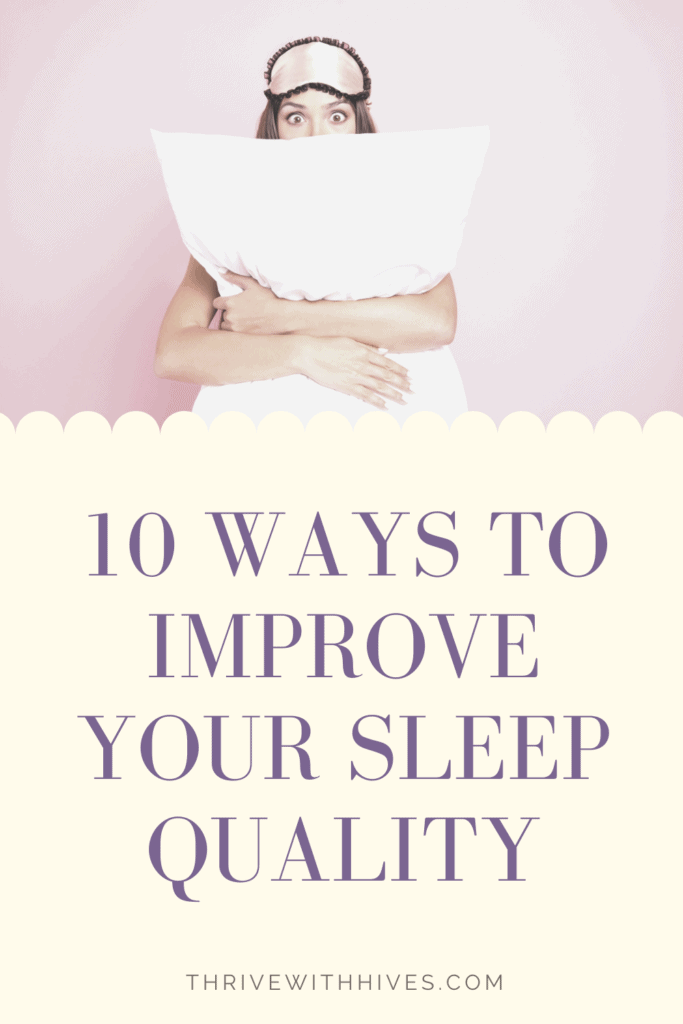10 Ways to improve sleep with night-time hives
Do you suffer from chronic urticaria? If so, have you found that your sleep is disturbed and it’s hard to get a good night’s rest? Well, you’re not alone. Many people who suffer from chronic urticaria find themselves with disrupted sleep patterns and increased symptoms at night.
My hives always seem to flare the worst during sleep hours. It doesn’t matter the time of day. When I worked graveyard shifts, they came during the day, and on the day shift, they showed up at night. It was maddening, and I was so desperate for a good night’s sleep.
It’s been shown that chronic urticaria patients have an increased risk of sleep disturbance. 7-9 hours of sleep is recommended for adults, but you aren’t likely to meet that goal when you have night-time hives.
A good night’s sleep is vital to our health. Poor sleep quality can lead to various problems, including increased pain, impaired memory, and decision-making skills, weight gain, and even heart disease.
Your body’s natural antihistamine levels lower naturally at night, leading to an increase of night-time hives.
Unfortunately, I cannot tell you how to cure your hives, but I can provide you with some tips to improve their sleep quality when faced with this challenge.
In this blog post, I will be discussing some of these methods to help you get better quality sleep.

I may earn a small percentage from products purchased through links on this site. I appreciate your support and would never link to something that I would not personally use.
Limit bluelight exposure
Turn off electronics an hour before bed. If you must use electronics before bed, invest in some blue-light blocking glasses like these. It may also be helpful to wear them during the day if you work on a computer.
Exposure to blue light technology can disrupt your body’s natural rhythm. Studies show that exposure to blue light decreases the amount of the sleep hormone melatonin that your body produces. You can read more about it here.
I turn off my electronics or use blue blocker glasses at least an hour before bed.
Create a relaxing environment
I use a salt lamp like this one for ambient light instead of a night light in the hallway so that the middle-of-the-night bathroom run isn’t as disruptive.
Keep your room dark with curtains closed. Use a sleep mask, if necessary, like my fan. I also cover any little light sources like those annoying blue, green, or red lights on electronics. This is what I use to cover them.
When I worked the night shift, I bought heavy black-out curtains like these and used black film on my windows to block out all sunlight. When I was on day shift, these also came in handy, and I discovered that my neighbor liked to leave their porch light on all night. The darker the room, the better your sleep.
Get rid of clutter in your bedroom. It’s important to have a clean, organized space so that you can feel relaxed when sleeping. Has laundry piled up on the dresser? Make sure they are folded and put away before bed. It doesn’t feel important, but clutter can generate stress and make it harder to sleep.
You can use lavender oil or bedtime blend in a diffuser or spray bottle for aromatherapy and relaxation if you can tolerate it. If you do this, please be sure you are using essential oils, not a product labeled with “fragrance.”
Sleep in a cool room.
This article by SleepAdvisor details the many benefits of sleeping in a cool room.
Of course, if heat is one of your triggers, you know the importance of keeping a cool sleep environment.
Keep your air on in the summer and heat lower in the winter, and upgrade your bedding to keep cool.
Check out ChiliSleep they make products to help keep you cool and comfortable for an optimal sleeping environment. They offer a 30 days trial so you can get your money back if it isn’t for you. Use coupon code Chilipad20 (20% off a full chiliPAD sleep system).
Another trick is to sleep with your (bare) feet outside the blanket.
Sync your circadian rhythm.
Get up when the sun is up and get some exercise. Avoid strenuous exercise before bed. I like to work out as part of my morning routine.
Here is an article by Johns Hopkins Medicine on the benefits of exercise for our sleep.
Increase light exposure throughout the day. UC Health outlines the importance of light exposure in this article.
Set a sleep schedule-Try to go to bed at the same time every night – even on weekends. Having a consistent sleep schedule has many benefits including better quality of sleep and lowering your risk of heart disease.
Invest in some blue blocker glasses if you like to watch tv or text before bed. I mentioned turning off electronics but I know that for many that is not something we will do. Lots of people like to watch Netflix at night or read on their phones or tablet. If you don’t want to give up the electronics, try wearing blue-blocking glasses to reduce the effects of light exposure. You can also download apps to your phone and tablet to reduce the amount of blue light exposure to you.
Journal before bed
If you stress or worry at bedtime, your mind will be distracted. You won’t get the rest and relaxation that is needed for a good night’s sleep. Try positive journaling to redirect your mind before going to bed so you can relax! Get all those thoughts out of your head and onto paper to reduce your chance of staying up thinking.
Enjoy a cup of herbal tea
A hot cup of herbal tea can help you relax, but not too close to bedtime or you may end up waking to empty your bladder. I usually have my tea about 2 hours before bedtime.
Great choices for winding down at night are chamomile, lavender, valerian, lemon balm, or look for a bedtime blend. Here is a variety pack of calming bedtime teas by Yogi.
*Remember when using herbal supplements, even teas, to check in with your pharmacist and doctor.
Take a hot bath or shower
If heat is not a trigger for you this can be a great way to relax before bed. Not only will showering at night also ensure you will be cleaner when you go to bed, but research also suggests there are sleep benefits depending on if you take a shower before going to sleep.
Taking a hot bath or shower before bed may improve sleep outcomes. Researchers theorize that this is due to your body temperature decreasing after bathing or showering because warm water can stimulate blood flow towards your hands and feet, allowing heat to escape from the body.
Try hypnosis or meditation
Meditation or hypnosis may help you relax and unwind your mind before bed. I love to listen to a guided meditation or hypnosis when I’m experiencing a lot of stress in my life. It is surprisingly effective. You don’t have to be perfect. I thought I “can’t meditate” for a long time because my mind was always going. The goal doesn’t have to be to completely empty your brain of all thoughts. Give it a try for a few nights, and you might be surprised. You can find many for free online.
Limit your night-time hives
I hate to even put this one here because, duh, but really, you will never get a truly decent sleep if you are up all night itching.
Of course, you should be working with your physician on a medication treatment plan but in the meantime, you can try some natural home remedies for hives before bed to try to ease your symptoms. I like to use Dermoplast spray in hot spots like the bottoms of my feet.
Talk to your doctor
You may want to avoid medications but sometimes we need medical interventions to improve our quality of life. Something as simple as changing the time you take your current medications may have an impact on your sleep quality.
Unfortunately, with Chronic Urticaria’s complexity, it is never an easy “here is the solution!” situation. I wish that was the case. If you are suffering from nighttime hives I hope these tips at least help you find something which helps your sleeping patterns and quality of life! If not, talk to a doctor about what’s going on. Quality of life should be our number one goal and if you aren’t sleeping, your quality of life will suffer.
Have you tried any of these strategies? What helps you get a better sleep when you have night-time hives? Share in the comments.

